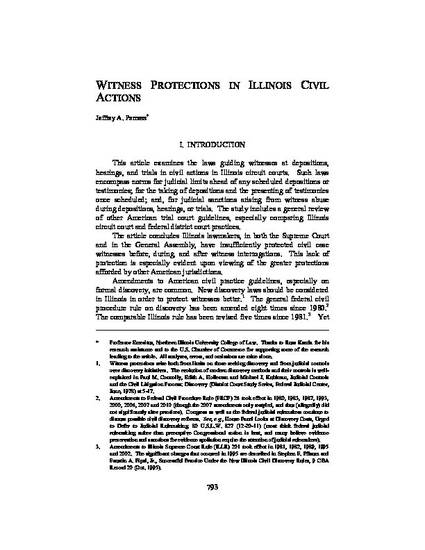
This article examines the laws guiding witnesses at depositions, hearings, and trials in civil actions in Illinois circuit courts. Such laws encompass norms for judicial limits ahead of any scheduled depositions or testimonies; for the taking of depositions and the presenting of testimonies once scheduled; and, for judicial sanctions arising from witness abuse during depositions, hearings, or trials. The study includes a general review of other American trial court guidelines, especially comparing Illinois and federal practices. The article concludes Illinois lawmakers, in both the Supreme Court and the General Assembly, have insufficiently protected civil case witnesses. This lack of protection is especially evident when viewing the greater protections afforded in other American jurisdictions. Amendments to Illinois civil practice guidelines are common. Yet the major federal changes involving compelled disclosures, meet and confer demands, certification standards, more limited relevancy, and discovery plans have not been added, leaving greater opportunities for witness abuse. In reviewing witness protections, the article confronts a few foundational questions, including whether all witnesses should be similarly treated and, if not, which witnesses require special protections. In other jurisdictions courts will consider, under the Apex Doctrine, the potential burden of a deposition relative to its likely benefits. Differentiated guidelines for entity leaders (and perhaps others) are often deemed necessary. The Apex Doctrine supplements written civil procedure laws promoting cost effective, convenient and nonduplicative information gathering. The article first explores appropriate guidelines for limiting future witness questioning at depositions, trials or hearings. This exploration considers the possible adoption in Illinois of the federal meet and confer mandate, or perhaps a more explicit and demanding case management conference rule on discovery scheduling. Next, current Illinois guidelines on the taking of depositions and on the giving of testimonies in trials and hearings are examined. The article explores possible new norms, including a good cause requirement for scheduling certain witnesses; a requirement that alternative routes of information or evidence procurement first be explored for certain witnesses; and, new time, place and manner restrictions that help mitigate the costs of scheduled depositions and testimonies. Finally, the article explores possible judicial actions following witness abuses during depositions and testimonies, including sanctions on parties, their lawyers and their law firms. Sanctions can involve public or private interests, thus encompassing both disciplinary referrals and costshifting. In assessing possible reforms, the article also considers whether actions by the Illinois General Assembly or the Illinois Supreme Court are most appropriate. While there is much shared civil procedure lawmaking authority, certain initiatives may need to be primarily, or exclusively, legislative or judicial in nature. Today, General Assembly authority over so-called statutory causes of action seems preeminent, while Supreme Court authority over certain civil jury trial procedures appears dominant.